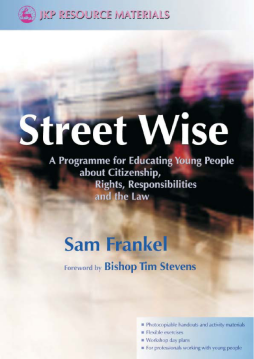
Additional Information
Book Details
Abstract
Designed to equip young people with the knowledge and skills they need to be street wise - to understand their rights and responsibilities - this resource challenges young people to engage in relevant moral questions through raising awareness of the criminal process and how it applies to them, so that that they can take a lead in developing better relationships within their communities.
Sam Frankel has devised a fully-photocopiable modular, flexible programme for use with individuals or in group work, covering topics such as police powers, stereotypes and peer pressure. Written for facilitators, this creative and interactive resource comprises exercises, facilitator's notes and handouts to help challenge young people to think about how they want to be seen, what behaviour they feel is right and wrong and the role and purpose of the criminal law.
This easy-to-use resource is suitable for secondary and tertiary school teachers, youth leaders and social workers working with young people aged 15 and above. It will also be of interest to those involved in family work with local Primary Care Trusts.
Sam Frankel PhD is Director of educational charity Act4, a provider of social responsibility programmes. Sam has extensive experience of criminal justice work, from volunteering with victim support to working both as a police officer and in criminal defence. He has developed sessions on criminal justice issues for primary school children, young people, police officers, university undergraduates and parents.
An important contribution to the prominent discourse around young people out on the streets… rather than simply seeing young people as a problem, the material within this book seeks to equip young people with the knowledge and skills needed to be seen as a constructive force within their communities.
Bishop Tim Stevens, Chair of The Children’s Society
Table of Contents
| Section Title | Page | Action | Price |
|---|---|---|---|
| 1. Introduction: Why uncertainty? Why listen to marginalised youth? | |||
| 2. Key concepts | |||
| 3. Youth-centred research and uncertainty: Method and approach | |||
| 4. Ethiopia context and themes | |||
| 5. Rural Fogera: Land shortages, adult status and migration | |||
| 6. Urban Woreta: Migrating in to street situations | |||
| 7. Drought-prone Hetosa: Status, success and migration | |||
| 8. Addis Ketema: Identity and support in street situations | |||
| 9. Nepal: Context and themes | |||
| 10. Rural Kapilvastu: Discrimination and uncertainty | |||
| 11. Rural Kapilvastu: Dealing with change and tradition | |||
| 12. Sindhupalchowk: Environmental fragility, youth responsibilities and migration in rural Nepal | |||
| 13. Kathmandu: Environment vulnerability, slums and family-support | |||
| 14. Genderfluidity: LGBTQI & third gender in Kathmandu | |||
| 15. Policy themes and impact: Introduction | |||
| 16. Conclusion: Listening to marginalised youth on uncertainty |
